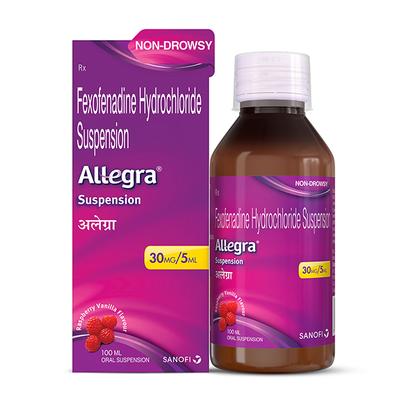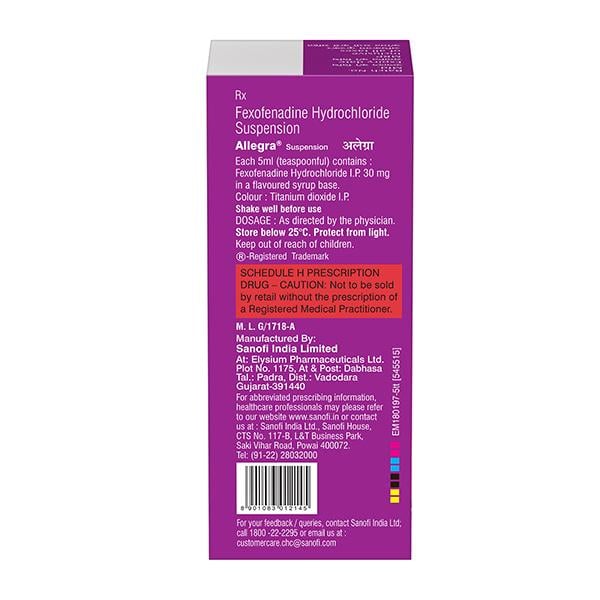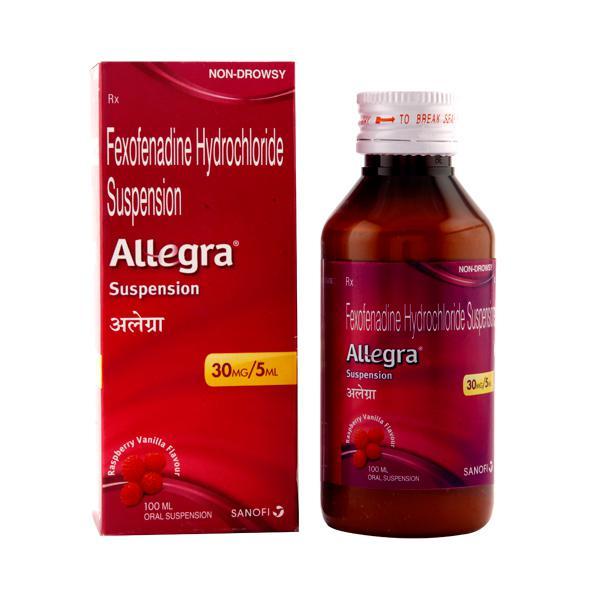

Netmeds First Membership
Quick Links
Introduction About ALLEGRA SUSPENSION
ALLEGRA SUSPENSION contains Fexofenadine, which belongs to the group of medicines called Antihistamines. It is used to provide relief from symptoms associated with seasonal allergic rhinitis in children (aged 2 to 11 years). It is also used to manage uncomplicated skin manifestations of chronic idiopathic urticaria in children (aged 6 months to 11 years of age).
Seasonal allergic rhinitis is an inflammatory condition of the upper airways that occurs in response to exposure to airborne allergens (such as tree, grass, and weed pollens) in sensitized individuals and is generally characterized by symptoms such as nasal stuffiness, itchy nose, throat, and eyes, headache, and weakness. Chronic idiopathic urticaria is a disturbing allergic condition of the skin that recurs without any known cause and is generally characterized by symptoms such as raised or swollen wheals on the skin, itching, and swelling of the lips, eyelids, or throat.
Avoid giving fruit juices (such as grapefruit, orange, and apple juice) to your child while taking ALLEGRA SUSPENSION since it may reduce the effect of this medicine. Before administering ALLEGRA SUSPENSION, inform your child’s doctor if your child has liver, kidney, or heart problems. ALLEGRA SUSPENSION is not recommended for use in children who are allergic to fexofenadine.
It is not indicated for use in pregnant and breastfeeding women since it is recommended for use only in children. The most common side effects of taking ALLEGRA SUSPENSION are headache, back pain, dizziness, stomach discomfort, pain in extremities, fever, middle ear infection, and vomiting. Contact the child's physician if any of the symptoms worsen.
Uses Of ALLEGRA SUSPENSION
- Relieves symptoms associated with seasonal allergic rhinitis in children (aged 2 to 11 years)
- Manages uncomplicated skin manifestations of chronic idiopathic urticaria in children (aged 6 months to 11 years)
How ALLEGRA SUSPENSION Works
ALLEGRA SUSPENSION works by blocking the actions of H1 histamine receptors (chemical substances responsible for allergic reactions) that result in managing the occurrence of seasonal allergic rhinitis and idiopathic urticaria, thus providing relief from the symptoms associated with both conditions.
How to use ALLEGRA SUSPENSION
Give ALLEGRA SUSPENSION to your child as advised by the physician. Shake well before each use. Your doctor will decide the correct dose and duration for your child depending on their age, body weight, and severity of the condition.
Side Effects Of ALLEGRA SUSPENSION
Common
- Headache
- Back pain
- Dizziness
- Stomach discomfort
- Pain in the extremity
- Fever
- Middle ear infection
- Vomiting
- Diarrhoea
- Excess sleepiness
- Weakness
- Accidental injury
- Indigestion
- Muscle pain
- Nausea
Uncommon
- tiredness
Rare
- nervousness
- sleep disorders
- paroniria (nightmares)
- signs of hypersensitivity reaction (immunologic reaction to allergen) such as sneezing, itchy, red eyes, wheezing
Stop giving ALLEGRA SUSPENSION to your child and contact doctor immediately if your child experiences any of the following side effects:
- signs of serious allergic reactions such as swelling of the face, lips, tongue or throat and difficulty breathing
How To Manage Side Effects
Diarrhea
Advise your child to drink plenty of water and stay hydrated. Try to avoid giving any medicine on your own to your child to manage diarrhea. Consult child’s doctor if the symptom gets worse.
Headache
Apply hot or cold-water bag on your child’s head. Advise your child to take rest in a quiet room. Massage child’s scalp or head with mild pressure for relieving effect. Consult child’s doctor if the symptom does not improve.
Indigestion
Advise your child to have smaller and more frequent meals and drink slowly. Avoid giving foods that are oily, fried or spicy foods. Consult child’s doctor if the symptom does not improve.
Nausea And Vomiting
Try to give ALLEGRA SUSPENSION to your child with or just after a meal or a snack. Follow simple meal plan for your child. Avoid giving foods that are oily, fried or spicy foods. Consult child’s doctor if the symptom does not improve.
Warning & Precautions
Pregnancy
ContraindicatedALLEGRA SUSPENSION is not recommended for use in pregnant women since this dosage is used only in children and adolescents (aged 6 months to 11 years).
Breastfeeding
ContraindicatedALLEGRA SUSPENSION is not recommended for use in breastfeeding women since this dosage is used only in children and adolescents (aged 6 months to 11 years).
Driving and Using Machines
Use with CautionALLEGRA SUSPENSION is not known to cause any impact while performing activities that requires mental concentration. Consult child’s doctor for advice
Kidney
Use with CautionALLEGRA SUSPENSION should be used with caution in children having kidney problems such as decreased kidney function. Consult child’s doctor before giving ALLEGRA SUSPENSION to your child.
Liver
Use with CautionALLEGRA SUSPENSION should be used with caution in children with liver problems such as liver impairment. Consult child’s doctor before giving ALLEGRA SUSPENSION to your child
Allergy
ContraindicatedDo not give ALLEGRA SUSPENSION to your child if they are allergic to Fexofenadine, or any other ingredients of this medicine.
Heart Disease
Use with CautionALLEGRA SUSPENSION should be used with caution in children having heart disease. Consult child’s doctor before giving ALLEGRA SUSPENSION to your child
Use In Pediatrics
SafeALLEGRA SUSPENSION is recommended for use in children (aged 2 to 11 years) to manage seasonal allergic rhinitis and in children (aged 6 months to 11 years of age) to manage uncomplicated skin manifestations of chronic idiopathic urticaria. Consult child’s doctor before giving ALLEGRA SUSPENSION to your child.
Interactions
A. Drug-Drug interactions:
Before giving ALLEGRA SUSPENSION to your child, inform to child’s doctor if your child is taking any of the following medicines:
- aluminum and magnesium gel (medicines used to relieve symptoms of heart burn or indigestion)
- ketoconazole (medicine used to manage fungal infections)
- erythromycin (medicine used to manage bacterial infections)
- omeprazole (medicine used to manage gastric and duodenal ulcers)
B. Drug–Food interactions:
Avoid giving fruit juices (such as grapefruit, orange and apple juice) to your child while taking ALLEGRA SUSPENSION since it may reduce the effect of this drug.
Overdosage:
If your child accidentally takes too much of ALLEGRA SUSPENSION, consult your doctor immediately or visit the nearby hospital. Signs of overdose includes dizziness, drowsiness, fatigue, and dry mouth.
Synopsis
| Drug | : | Fexofenadine |
| Pharmacological Category | : | Antihistamines |
| Therapeutic Indication | : | Seasonal allergic rhinitis, Chronic idiopathic urticaria |
| Dosage Forms | : | Oral dispersible tablet, Tablet, Oral suspension, Syrup |
More Information
- Keep ALLEGRA SUSPENSION out of reach of children
- Store at room temperature
FAQs About ALLEGRA SUSPENSION
Q: What is Allegra Syrup used for?
A: Allegra Syrup is used to relieve symptoms of allergic rhinitis (like repeated sneezing, nasal congestion, runny nose, nasal itching, watery, red or itchy eyes, skin rashes with itching) in children aged between (2-11 years).
Q: What is the dosage of Allegra Syrup for a 5-year-old?
A: A typical range of 4-5ml twice a day might be prescribed by your physician. However, your doctor is the right person to suggest you the optimal dosage and duration of Allegra Syrup for your child based on their age and body weight.
Q: Can I use Allegra Syrup for children?
A: Yes. Allegra Syrup is a prescription medicine used for managing symptoms of allergic rhinitis (like repeated sneezing, nasal congestion, runny nose, nasal itching, watery, red or itchy eyes, skin rashes with itching) in children aged between 2-11 years.
Q: Is Allegra Suspension good for kids?
A: Yes. Allegra suspension effectively relieves the symptoms of allergic rhinitis (like repeated sneezing, nasal congestion, runny nose, nasal itching, watery, red or itchy eyes, skin rashes with itching) in young children.
Q: What are the side effects of Allegra Suspension?
A: The most common side effects of taking Allegra Suspension are fatigue, drowsiness, dizziness, blurred vision, headache and nausea. Consult your doctor if any of these side effects trouble you.
Q: Does Allegra Syrup make my kid feel sleepy?
A: Allegra Syrup may make your kid feel sleepy/drowsy, as this medicine acts on the histamine receptors of the peripheral body parts. However, compared to other similar medicines, Allegra syrup is less likely to induce drowsiness and therefore considered safe for use in children.
Q: Who should not take Allegra Syrup?
A: Allegra Syrup should not be used in patients who are allergic to fexofenadine. It should be used with caution among children with liver, kidney and heart problems.
Q: Can I administer other medicines along with Allegra Suspension to my child?
A: The simultaneous use of Allegra suspenion with certain medications can lead to interactions. Ensure to inform your healthcare provider if you are taking any of the following: oral antibiotics (such as Erythromycin), oral anti-fungals (such as Ketoconazole), or antacids.
Q: Can I mix Allegra Suspension in fruit juices and give it to my child?
A: Refrain from administering Allegra Suspension alongside fatty meals and fruit juices, as both can diminish the medication's absorption in the gastrointestinal tract. If necessary to give it to your child, ensure a minimum 4-hour gap to mitigate potential interactions between the medication and food.
Q: Can I use Allegra Syrup to make my child sleep faster?
A: Avoid administering Allegra Suspension to your child as a means to induce sleep. It's advisable to seek guidance from a healthcare professional if your child experiences sleep difficulties or if you have any concerns about utilizing this medication.
Q: Can I stop giving Allegra Syrup to my child once the symptoms disappear?
A: Strictly follow the dosing guidelines as advised by your doctor. Avoid stopping the therapy before the stipulated duration without consulting your doctor as it might cause the symptoms to re-appear.
Q: What precautions should I follow while giving Allegra Suspension (Raspberry & Vanilla Flavour) to my child?
A: Avoid giving fruit juices (such as grapefruit, orange and apple juice) to your child while taking Allegra Suspension since it may reduce the effect of this medicine. Inform child’s doctor about previous allergy, medical and medication history to avoid unusual interactions or problems in your child.
Q: What is the use of ALLEGRA SUSPENSION?
A: ALLEGRA SUSPENSION contains fexofenadine, which is an antihistamine agent used in children to provide relief from symptoms associated with seasonal allergic rhinitis in children (aged 2 to 11 years). It is also used to manage uncomplicated skin manifestations of chronic idiopathic urticaria in affected children (aged 6 months to 11 years). If you wish to buy ALLEGRA SUSPENSION on Netmeds, you need a prescription from a registered medical practitioner. Netmeds has made buying online medicines more easy for consumers and is one of India's leading online pharmacies.
Q: How should ALLEGRA SUSPENSION be taken?
A: Always give ALLEGRA SUSPENSION to your child as advised by your child’s doctor. It is for oral use only. Shake the suspension well before each use. Use the measuring device provided with the medication to ensure accurate dosing. Follow the dosage instructions provided by your doctor or pharmacist.
Q: Can I mix ALLEGRA SUSPENSION in fruit juices and give it to my child?
A: Refrain from administering ALLEGRA SUSPENSION alongside fatty meals and fruit juices, as both can diminish the medication's absorption in the gastrointestinal tract. If it is necessary to give it to your child, ensure a minimum 4-hour gap to mitigate potential interactions between the medication and food.
References
1. KD. Tripathi. Histamine and Antihistaminics. Essentials of medical pharmacology. Eighth edition. 2019. Page – 166.
2. Kari L. Craun, Mark P. Schury. Fexofenadine. NIH National Library of Medicine. National center for biotechnology information. May 2022. [Accessed on 25th March 2024] https://www.ncbi.nlm.nih.gov/books/NBK556104/
3. Sanofi. Safety, Efficacy and Pharmacokinetic Study of Allegra in Pediatric Patients with Perennial Allergic Rhinitis (PAR). NIH U.S. National Library of Medicine ClinicalTrials.gov. [Revised in 2013] [Accessed on 25th March 2024] https://clinicaltrials.gov/ct2/show/NCT01244217
4. Sanofi-Aventis U.S. LLC. U.S. Food & Drug Administration (FDA). [Revised in July 2007] [Accessed on 25th March 2024] https://www.accessdata.fda.gov/drugsatfda_docs/label/2008/020872s018,021963s002lbl.pdf
5. Ciplamed Ltd. Fexigra Oral Suspension (Fexofenadine hydrochloride). Ciplamed [Revised in January 2020] [Accessed on 25th March 2024] https://www.ciplamed.com/content/fexigra-oral-suspension
Useful Diagnostic Tests
- Complete Blood Count (CBC)/ Hemogram
- Total IGE
- Absolute Eosinophil Count, Blood
- Basic Allergy Package
- Allergy Comprehensive Profile
- Allergy Post Screening Profile
- Men Health Checkup - Advanced
- Complete Women Checkup
- Senior Citizen Checkup - Female
- Senior Citizen Checkup - Male
- Women Health Checkup – Essential
- Full Body Checkup - Gold
- Elderly Checkup - Female
- Elderly Checkup - Male
- Full Body Checkup – Silver












